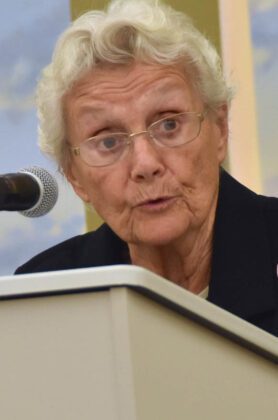Click here to view a video recording of the Hour of Reflection
“We human beings are totally dependent on aspects of the natural world. We cannot live without trees. They give us oxygen. We cannot live without water. We cannot live without plants to feed us. We cannot live without the natural world.”
The quote is from Sr. Dianne Bergant, CSA, who led an online Lenten Hour of Recollection with SCJs on March 13. Her topic? Laudato Sí: On Care for our Common Home, Pope Francis’ 2015 encyclical.

Sr. Dianne referred to the story of Creation found in Genesis in which human beings were made in God’s image, God’s likeness. “God blessed them and God said to them: Be fertile and multiply; fill the earth and subdue it. Have dominion over the fish of the sea, the birds of the air, and all the living things that crawl on the earth.”
She emphasized that the words “subdue” and “have dominion” do not mean that nature is at the disposal of humans.
“We care for the world in an anthropocentric way,” said Sr. Dianne. “We can’t help it. We are concerned about toxic land because it makes us humans sick. We become concerned about toxic water because of its effect on us humans.”
In Laudato Sí Pope Francis encourages environmentalism not just as a list of tasks, such as recycling, but as a way of caring for the natural world in a manner that mirrors the way that God cares for the natural world. To “care for our common home” we must go beyond thinking simply about how the natural world affects humans.
“Species have gone out of existence due to human selfishness… and some species we need desperately,” she said.
“Who cares about the bees?” she asked. “Everybody should! Without bees, we don’t have certain pollination. And without that pollination we may not have certain crops. We need bees in order to survive. And these aren’t the only things in the natural world that we need to survive.”
In Laudato Sí Pope Francis urges people to look at the interconnectedness of the world, and the interdependence of human beings within it.
“To say that we represent God in this world is a great privilege, a responsibility,” said Sr. Dianne. “We have responsibility to subdue and have dominion in a way that allows things survive and thrive, not in a way that allows them to be polluted and destroyed…
“Once we accept this great privilege and responsibility to function in the world as an image of God, then in a certain sense, all of creation is dependent on our faithfulness. If we are faithful, nature will thrive as it is meant to thrive. If we are unfaithful it will diminish, disappear, destroyed by pollution. We must be faithful to our privilege and responsibility to represent God in the natural world.”
Sr. Dianne emphasized that humans live out this faithfulness dependent on one another. “With all of our diversity we need each other desperately to survive and to thrive. We need different cultures, points of view, genders, all of the diversity for true unity. Unity presumes diversity. Without diversity, there is just uniformity.”
Concluding her presentation, Sr. Dianne left SCJs with a question to reflect on as they prepare to commemorate the 180th anniversary of the birth of the founder, Fr. Leo John Dehon, as well as the 100th anniversary of the Dehonian presence in the United States:
“How good are you at being stewards of the treasury of the earth?” asked Sr. Dianne. “What kind of stewards are you as individuals? How is your local community a good steward of the earth?
“What kind of stewards of the earth are you as a congregation?”

